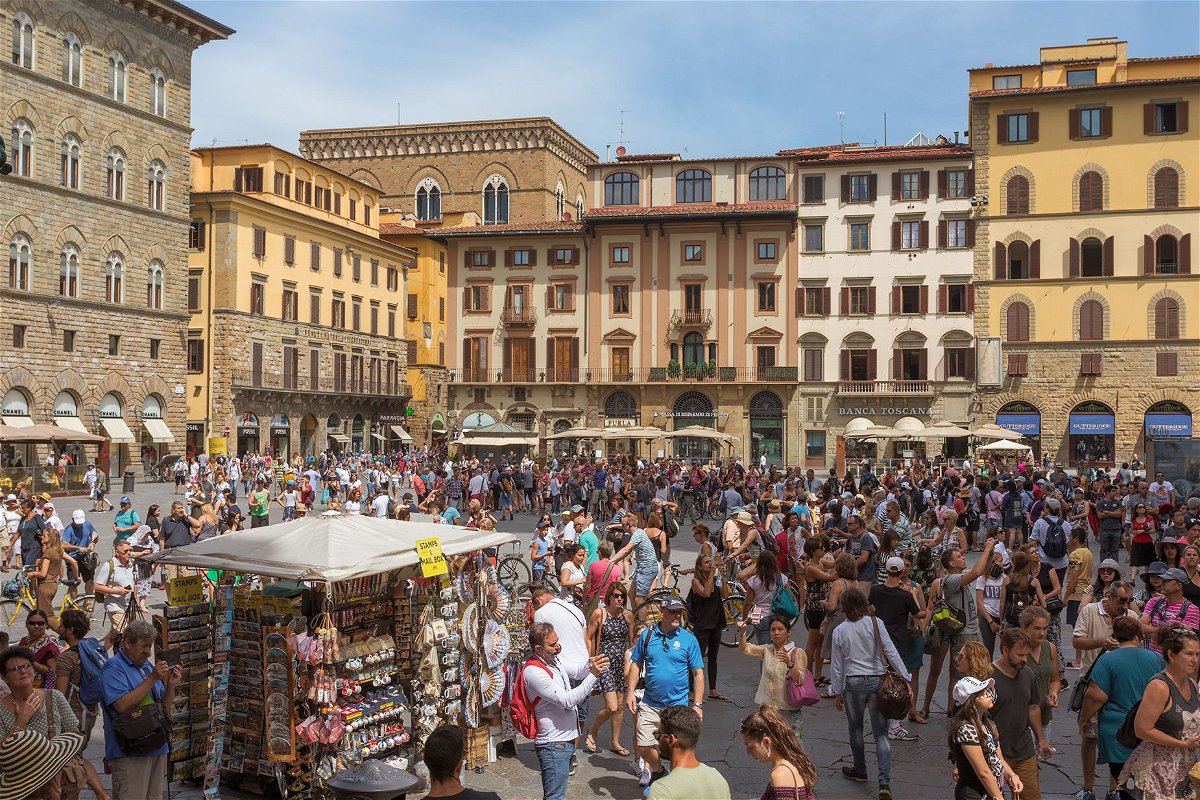Italy’s vacation hotspot wants to ban new Airbnbs

Florence's central square
Julia Buckley, CNN
(CNN) — As Europe continues to be squeezed by overtourism and short-term rentals mushroom to accommodate visitors, cities across the continent are noting more and more that residents are being squeezed out.
Now, one of Europe’s biggest tourist destinations is taking action. The city of Florence has announced plans to ban new short-term rentals such as Airbnbs.
The new legislation, which will be voted on next Wednesday and is expected to be active by November, will ban any further properties in the historic center of the city being registered as short-term rentals.
Mayor of Florence Dario Nardella said in a statement shared with CNN that the “very important” legislation was tackling “an emergency situation of total deregulation.”
“We are witnessing a progressive growth in the influx of tourists which has become even more pronounced since the pandemic,” he added.
Figures from the city council show that 75% of Florence’s short-term rentals are concentrated in just 5% of the municipal territory – the city’s centro storico, the birthplace of the Renaissance and a UNESCO World Heritage site. The legislation aims to tackle that 5%.
If approved, the legislation will ban the registration of any new short-term rentals in the city center. Additionally, in a bid to incentivize residential contracts, any owners who convert Airbnbs into a long-term residential let will have their property taxes on the building zeroed out for three years.
The law will not be retroactive – so anyone with an existing short-term rental contract will be able to retain it. Around 4,000 new registrations have been made since the move was announced, according to local media. Some were already operating illegally; others are putting in requests for plans to Airbnb their properties in the future.
Nardella said that the authorities were taking action to protect Florence’s global heritage.
“We are putting a simple ban in the UNESCO area to meet our responsibilities of protecting the cultural and material identity of the centro storico, and to dampen the effect of rent increases across the entire city – which are directly linked to the boom of short-term tourist rentals.”
Calling for urgent national legislation from the government, Nardella said that the Florence authorities had “rolled up our sleeves because for too long we’ve been asking for regulation that never happens.”
He added: “We cannot watch our centro storico changing and we cannot cope with all the problems of citizens unable to find an apartment to rent.
“Faced with inertia from the government and parliament, it’s our duty to act to put the brakes on this social emergency.”
Not everyone is delighted. Lorenzo Masi, a councilor with the populist Five Star political movement, has queried “what will happen to those who aren’t renting [property] in an entrepreneurial way, but are for example renting a room in the home they live in – in many cases to offset costs.”
“We would need plans that include these kind of situations, in which the most disadvantaged groups are not compared with those who are working purely on a business level,” he said in a statement.
A spokesperson for Airbnb told CNN: “We recognize the challenges facing historical cities across Italy and we want to help. We have proposed national regulations for short-term rentals in Italy that are clear and simple to follow, and would ensure responsible home-sharing in every city and town.”
Follow the money
For some, the proposals don’t go far enough. “What the mayor has done is great, but without inspections, it’s not enough,” said Veronica Grechi, owner of Velona’s Jungle B&B on the edge of Florence’s city center. Grechi describes the way that much of the short-term rental sector is managed as “non-professional and wild west,” with many property owners operating rentals without declaring them to the authorities.
Grechi – who says that when recently looking for cleaning staff, companies offered to work with her on the condition that she paid them 80% cash in hand, declaring only 20% to the tax man – says that if authorities conducted checks on properties and followed the money, the number of Airbnbs would naturally drop.
“Everyone does it [rent short-term] at the moment because it’s easy – it costs nothing. If you make people do it professionally, the numbers [of Airbnbs] would go down immediately, because it wouldn’t be worth them doing it.”
Growing opposition to Airbnb
Florence is the latest destination to attempt to stem the rising tide of Airbnbs.
New York City has introduced what Airbnb has deemed a “de facto ban” on short-term rentals. Properties can only be registered for rentals of under 30 days if the host is living in the property at the same time as the guests, of which there can be no more than two.
Portugal has also laid out new housing laws this summer which cast uncertainty over short-term rentals.
In Amsterdam, owners can rent out properties for a maximum 30 days per calendar year, for a maximum of four guests at a time.
In Berlin, entire properties can be rented short-term for a maximum 90 days per year.
The-CNN-Wire
™ & © 2023 Cable News Network, Inc., a Warner Bros. Discovery Company. All rights reserved.